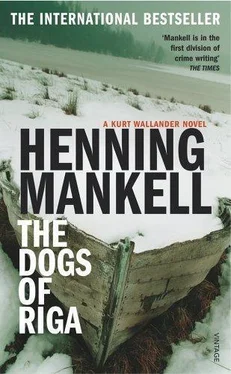He went through the clothes one more time. There's something I'm not seeing, he thought. Rydberg, help me.
But Rydberg had nothing to say.
Wallander went back to the police station. He knew the post-mortems would take several hours, and that he wouldn't get a preliminary report until the next day at the earliest. Back in his office, he found a note on his desk from Björk, saying they should wait another day or so before calling in Interpol. Wallander felt himself getting annoyed: he often found it hard to sympathise with Björk's cautious approach.
The meeting at 6 p.m. was brief. Martinsson reported that there was no record of any missing persons who could possibly be the men in the life-raft. Svedberg had had a long discussion with someone at the meteorological office in Norrkoping who had promised to help the moment he received a formal request from the Ystad police.
Wallander told them that as expected, the pathologist had confirmed that both men had been murdered. He asked Svedberg and Martinsson to consider why someone would have shot two men and then put their jackets back on the bodies.
"Let's keep going for a few more hours," Wallander said. "If you're involved in other cases, either put them on ice for the time being or pass them on to somebody else. This is going to be a tough nut to crack. I'll see to it that we get some more men first thing tomorrow."
When Wallander was alone in his office, he unrolled the chart on his desk again. With his finger, he traced the coastline as far as Mossby Strand. The raft could have drifted a long way, he thought. Or no distance at all. It might have been drifting backwards and forwards on the tide.
The phone rang. For a moment he tried to decide whether to answer it: it was late, and he wanted to go home and think about what had happened in peace and quiet. But he lifted the receiver.
It was Mörth.
"Have you finished already?" Wallander asked, surprised. "No," Mörth said. "But there's something I think is important. Something I can let you know now." Wallander held his breath.
"The men are not Swedes," Mörth said. "At least, they weren't born in Sweden." "How can you tell?"
"I've had a look at their teeth," Mörth said. "Their dental work wasn't done by Swedish dentists. Could have been by Russian ones, though." "Russian?"
"Yes. Russian dentists. Or dentists from one of the Eastern bloc countries. They use quite different methods from us."
"Are you absolutely sure?"
"I wouldn't have rung otherwise," Mörth said, and Wallander could tell he was annoyed.
"I believe you," he said quickly.
"There's another thing," Mörth continued. "Something that might be at least as important. These two men were no doubt very relieved when they were shot, if you'll pardon my cynicism. They'd been tortured pretty comprehensively before they died. Burns, peeled skin, thumb-screws, the whole damned lot."
Wallander sat in silence.
"Are you still there?" Mörth asked.
"Yes," Wallander said. "I'm still here. I'm just letting what you said sink in."
"I'm quite sure about it."
"I don't doubt that for a moment. This is a bit out of the ordinary, though."
"That's precisely why I thought it was important to phone you."
"You did the right thing," Wallander said.
"You'll get my full report tomorrow," Mörth said. "Apart from the results of laboratory tests that will take a bit longer."
He hung up. Wallander went out to the canteen. The room was deserted. He poured out the last drops from the coffee machine, and sat down at one of the tables.
Russians? Men from the Eastern bloc, tortured? Even
Rydberg would have thought that this looked like being a difficult and lengthy investigation. It was 7.30 p.m. when he went to his car and drove home. The wind had died down, and it had suddenly become colder.
Shortly after 2 a.m. Wallander woke with terrible chest pains. He was convinced that he was about to die. The constant stress and strain of police work was having its effect. He was paying the price. He was motionless in the dark, filled with despair and shame. He had left things too late; he was never going to make anything of his life. His anxiety and pain seemed to grow more and more intense. Afterwards he wasn't sure how long he'd lain there; unable to control his mounting fear, but slowly he had managed to reassert his self-control.
He got carefully out of bed, pulled on some clothes, and went down to his car. The pain seemed less intense now; it came and went in waves, moving out into his arms, losing something of its initial force. He got into his car, tried to make himself breathe calmly and then drove through the deserted streets to the hospital's emergency entrance. He encountered a nurse with friendly eyes, who listened to him, and didn't seem to regard him as a hysterical, rather overweight hypochondriac. Wallander lay on a trolley, listening to a drunk ranting in one of the treatment rooms, the pain coming and going, until suddenly he found a young doctor standing beside him. He described his chest pains once again. His trolley was wheeled into a treatment room and he was wired up to an ECG machine. They took his blood pressure, felt his pulse, and answered various questions: no he didn't smoke, he hadn't experienced chest pains before, as far as he knew there was no history of heart disease in his family. The doctor scrutinised the ECG reading.
"Nothing special here," he said. "Everything seems to be normal. What do you think might have caused this?" "I have no idea."
The doctor studied Wallander's records. "You're a police officer, I see," he said. "I imagine things can get a bit hectic at work now and then." "It's like that more or less all the time." "What about your alcohol intake?" "I like to think it's normal."
The doctor sat down on the edge of a table and put down the record cards. Wallander could see that he was very tired.
"I don't think you've had a heart attack," he said. "It might be your body sounding the alarm, announcing that everything isn't as it should be. You're the only one who can know about this."
"That's probably it," Wallander said. "I ask myself every day what my life is doing to me. And I realise I don't have anybody I can talk to."
"You should have," said the doctor. "Everybody should."
He stood up when his pager started peeping like a fledgling in his pocket.
"I'm going to keep you in overnight," he said. "Try to get some rest."
Wallander lay there quite peacefully, listening to the hum of an invisible air conditioning fan. He could hear voices in the corridor.
All pain has a cause, he thought. If it isn't my heart, what is it? The guilt I have at failing to devote enough time and energy to my father? Worry because I suspect the letters my daughter sends me from university in Stockholm don't tell the full story? That things are not at all as she describes them, when she says she likes it there, and is working, and feels that at last she's doing something she wants to be doing? Could it be that although I'm not conscious of it, I'm constantly afraid she's going to try to take her own life again, as she did when she was 15? Or is the pain due to the jealousy I still feel at Mona leaving me, even though that was a year ago now?
The light in the room seemed very bright. He felt that his whole life was characterised by a sense of desolation that he simply couldn't shake off. How could the kind of pain he'd just been feeling be caused by loneliness? He couldn't come up with any solution that didn't immediately fill him with doubt.
"I can't go on living like this," he said out loud. "I've got to get my life sorted out. Soon. Now."
He woke up with a start at 6 a.m. The doctor was standing by his bed, watching him. "No more pain?" he asked.
Читать дальше












